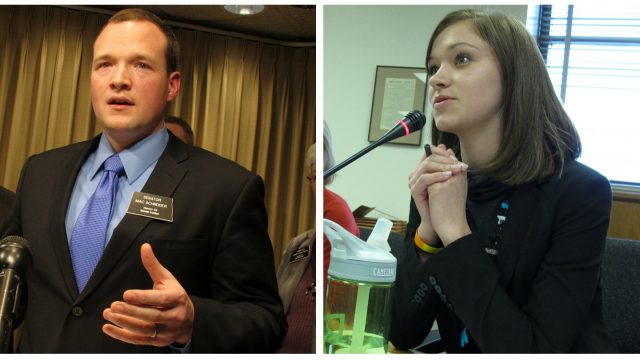Democratic Party Chairwoman, Senate Minority Leader Almost Failed to Make General Election Ballot

Last week, after the primary vote, I noted that so many Democrats had crossed over to vote on the Republican ticket for gubernatorial candidate Doug Burgum that it actually put a long list of Democratic state lawmakers at risk of not making the general election ballot.
Section 16.1-11-36 of the North Dakota Century Code states that primary candidates may not advance unless they receive, at a minimum, a vote total equal to or greater than the number of signatures required to place them on the primary ballot in the first place.
According to section 16.1-11-11, “Candidates may file a Petition/Certificate of Nomination with the Secretary of State containing signatures equal to 1% of the total population of the legislative district. However, no more than 300 signatures are required.
[mks_pullquote align=”right” width=”300″ size=”24″ bg_color=”#ffffff” txt_color=”#000000″]While all the legislative candidates did ultimately make the general election ballot, the final vote results showed 25 Democratic legislative candidates – including party chairwoman Kylie Oversen and Senate Minority Leader Mac Schneider – were near misses.[/mks_pullquote]
Legislative districts are apportioned by population, and so have an average population of just over 14,000. That means legislative candidates must get at least 1 percent of 14,000. According to a Mike Nowatzki report from the meeting of the State Canvassing Board today, where the election results were certified, legislative candidates had to get between 137 and 149 votes (depending on the population of their districts).
While all the legislative candidates did ultimately make the general election ballot, the final vote results showed 25 Democratic legislative candidates – including party chairwoman Kylie Oversen and Senate Minority Leader Mac Schneider – were near misses.
That’s bad. Like, really bad. Almost a disaster. Democrats have been cavalier about the crossover vote, but they shouldn’t be.
Meanwhile, Republicans say the 1 percent rule should be gotten rid of leaving just a flat 300 vote requirement to move on to the statewide ballot. “During a lull in Friday’s meeting, GOP Executive Director Roz Leighton, who serves on the five-member board, said the threshold should be higher for legislative candidates as well as statewide candidates, who need 300 signatures to get on the primary ballot unless they receive their party’s official endorsement,” Nowatzki reported.
I agree. If for no other reason to force the political parties to keep their voters in their columns.
This list, compiled by Nowatzki (and largely the same as the one I posted previously) shows the legislative candidates who received fewer than 300 votes. As a point of reference, consider the lowest vote total for Republicans running for the legislature was House candidate Curtiss Kreun’s 683 votes. Only four Republican legislative candidates got fewer than 1,000 votes.
District 16 Senate: Tyler Axness 249 (149)
District 28 Senate: Dustin David Peyer 266 (138)
District 30 Senate: Chris Rausch 287 (147)
District 32 Senate: Tiffany Hodge 272 (146)
District 36 Senate: John Fielding 224 (141)
District 40 Senate: Phil Franklin 206 (143)
District 42 Senate: Mac Schneider 275 (141)
District 2 House: Doug Hoffman 234 and Brandon Delvo 214 (147)
District 8 House: Agnes Jennings 306 and Casey Buchmann 297 (142)
District 16 House: Lisa Dullum 223 and Ben Hanson 201 (149)
District 30 House: Kathleen Risch 267 and Tom Asbridge 247 (147)
District 32 House: Cheryl Ann Kary 251 and Karen Ehrens 247 (146)
District 36 House: Dean Meyer 208 and Linda Kittilson 207 (141)
District 38 House: Susan Rintoul 210 and Richard Rintoul 198 (141)
District 40 House: Heidi Rintoul 191 and A.J. Schultz 159 (143)
District 42 House: Kylie Oversen 258 and Grand Hauschild 216 (141)




